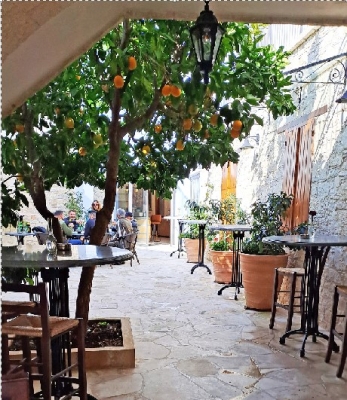Omodos, Cyprus
On a Thursday in January, we set off from Paphos, Cyprus, in glorious sunshine to visit this picturesque mountain village in the Troodos range.
Full of cafés and shops with local, home-made produce, it entices with local Cyprus 'delight' (loukoumi), crystallized fruits in honey syrup, baked specialties including big, hard and soft bagels/kaaks, leatherware and lace.
Vineyards and wineries are dotted about the surrounding area with plenty of wine shops and wine bars in evidence. The Monastery of the Holy Cross, the oldest in Cyprus, is also here and draws many visitors. According to a plaque next to his bust outside the west entrance, its abbot was murdered by the Turks in the 19th century. Another source states he was hanged in 1821, charged with preparing an uprising against Ottoman rule.
We met some interesting people.
A young man and his girlfriend were exiting their car next to ours. He lifted some scrolls out of his car boot and showed them to the girl. The glossy side was covered in thumbnail-sized prints of people's faces with captions. Who were these people? The slender youth, who looked impossibly young to be sporting such a luxuriant moustache, told us he was in the army. The photos were a roll call of Greek Cypriot soldiers and civilians who had gone missing during the Turkish invasion of Cyprus in 1974. They have never been found.
During a meander around the village, dark clouds gathered, the wind turned cold and rain began to spatter with much more threatening. Time to head back to Paphos.
En route, the rain stopped, and in a hamlet, we spotted a stone built café and terrace with three flags and a fine view. The perma-smile proprietor provided a cappuccino and hot chocolate before keenly perching himself on a chair for a chat with us - his only customers. In his early 60s and spending his days preparing food and drink for his tourist clients, with his wife helping in the evenings, he had only started this venture a few years ago. The premises had been built by the local council and rented from it.
What had he done beforehand? In excellent, but heavily accented, English, he told us that he had obtained a master's degree in Economics at Birmingham University (UK) followed by a PhD at LSE (London University's School of Economics). Afterwards, he had become a professor of economics at Nicosia University, but the restrictions of Covid and the lack of a full structure for online lecturing meant his teaching was severely curtailed. So, he retired and took over the café.
"What does your wife do during the day?" I queried. His wife, he told us matter-of-factly, also had a PhD in physical chemistry, but headed quality control at a Cypriot pharmaceutical company prior to helping him in the evenings during the tourist season. Their only child, a daughter, was a lawyer and compliance officer at an "Israelite" investment company in Nicosia. We told him we too were "Israelites".
It had turned so cold by now that we ventured inside for a look around his rustic, yet modern, domain. Two, thin, elderly, local men with weather-beaten, leathery faces were sitting at a table drinking coffee warming themselves near a wood burning stove. One valiantly attempted to engage us in a friendly conversation in halting English. We glanced into a shady corner and noticed another man lying on a sofa covered by a tartan blanket, watching us. We waved at each other. "Your father?" I ventured. "In-law," responded our host. "He sleeps too much," he added.
Living nearby, three villages down, our new friend had found his own Shangri-la in the Troodos mountains.








Comments